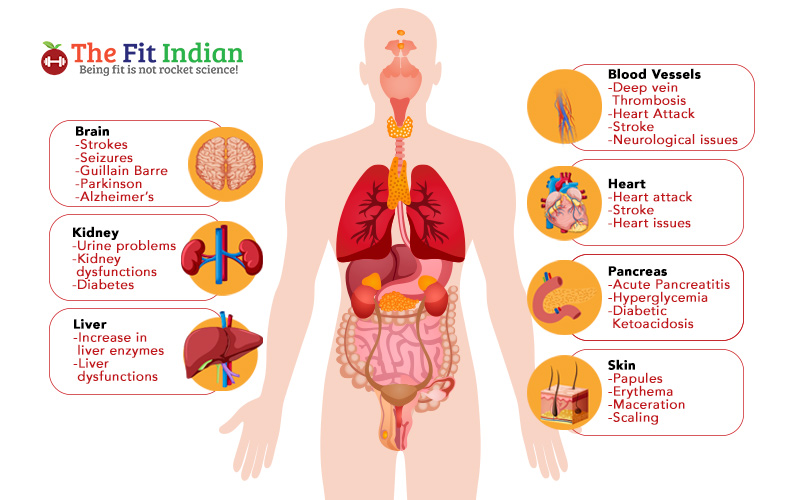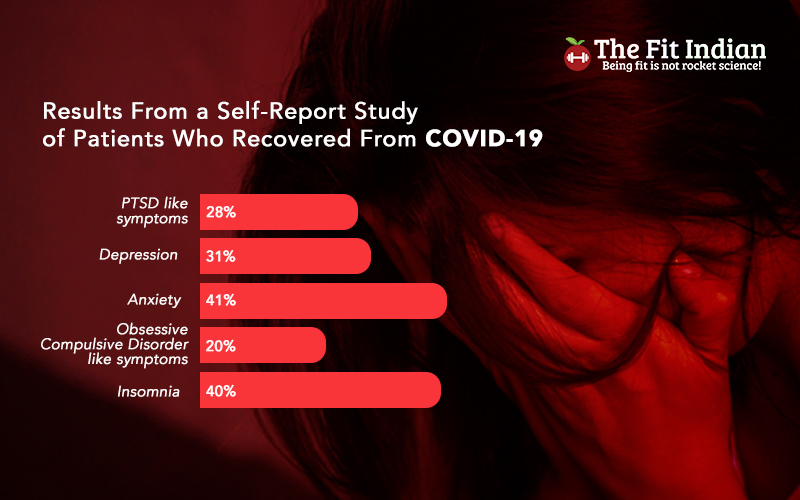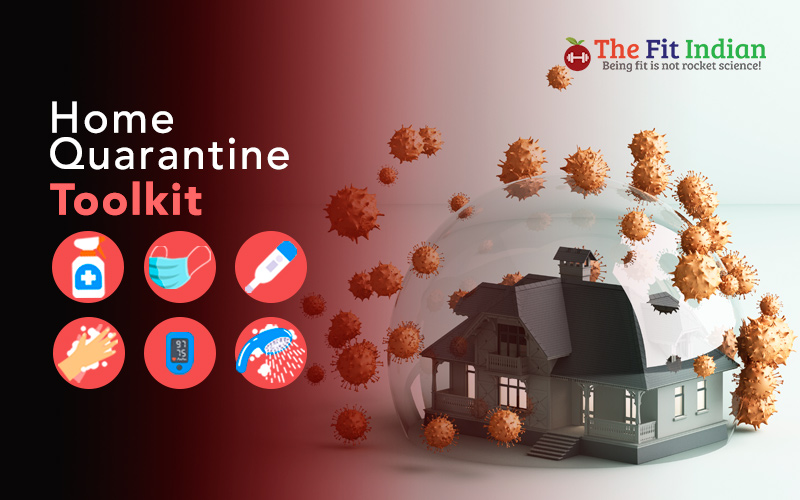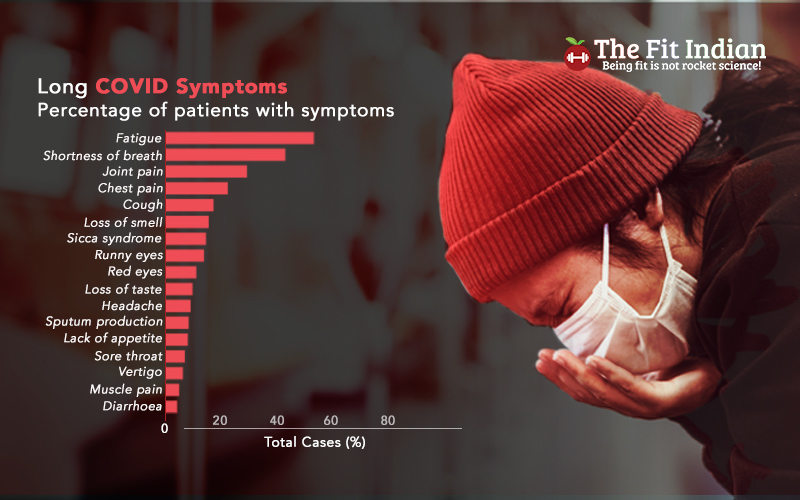Post Covid Syndrome – Long-term Effects, Preventive Measures & Home Remedies
Reviewed by: Dr Swamy K B | Author: Manoja Kalakanti
Even a mild case of COVID-19 is turning critical in this Second Wave of 2021. The alarming signs of COVID-19 which you can experience in this deadly Second Wave are continuous headache, extreme fatigue, and headache. You’ll be surprised to know that, people who are officially declared as ‘recovered’ or who are in the Post COVID phase, have started showing some persisting signs of COVID-19 even after weeks or months post-recovery. It has been observed that the symptoms linger even after testing negative for the virus. This group of people is currently referred to as ‘COVID-19 Long Haulers’ and their conditions are known as Post COVID Syndrome.
The symptoms that linger are said to persist for more than four weeks and affect our health miserably, even after having an initial recovery. Those who are aged or those who have poor immunity, continue to experience fatigue, weakness, loss of smell and taste, and other symptoms for quite some time. So, those who, after acquiring a medical recovery certificate, when they undergo a Post COVID-19 Syndrome phase desire to sort remedies at home. For it, you need to have wide knowledge about Post COVID-19 Syndrome, to rightly adopt preventive measures or home remedies for it.
What is Post COVID-19 Syndrome?
Post COVID-19 Syndrome or Post COVID-19 condition is an array of new, returning, or persisting health problems that you might experience for another four weeks post-recovery from the infection, and this will create certain complications and affect your health in an adverse manner.
Some of the recently acknowledged symptoms are:
- Abnormal heart rate
- Chronic fatigue
- Persistent diarrhea
- Rapid weight loss
- Digestive issues
- Digestive Issues
- Severe to mild inflammation in the brain
- Nausea and vomiting
- Loss of appetite, taste and smell
- Reduced Exercise tolerance
- Disturbed sleep pattern
- Muscle weakness
- Neuropsychiatric complications
It should be noted that Post COVID-19 syndrome is common among those who are Asymptomatic or are not showing symptoms when they are infected. These conditions vary differently and the combination of their health problems vary for different length at different times and this overall give rise to three distinctive types such as:
- Long COVID-19
- Multiorgan Effects Of COVID-19
- Effects of COVID-19 Treatment or Hospitalization
Thus, it can be said that there are multiple ways to help and manage Post COVID-19 conditions and the most effective way is by taking medical consultation as they can prescribe you certain supplements and diet charts that can help you boost up your immune system.
How soon can these symptoms show up?
There is a possibility that symptoms like fatigue can be an integral part of your recovery process. Other symptoms like sore throat or headache, can again revert after a day or two of your discharge or after you tested negative for COVID-19. 80% of the Post COVID-19 patients have been showing signs of fatigue and weakness and they are unable to carry forward with their old exercise schedule and sleep routine. It becomes hard for the Post COVID-19 patients to get over with their quarantine period as Post COVID-19 lingers and it becomes almost impossible for them to get over it.
Some Reported Cases of Post COVID-19
Persistent symptoms in patients after COVID-19 have turned into a common phenomenon. Old people and those who have serious health issues or medical conditions are likely to experience lingering COVID-19 symptoms. It is not only restricted to old age but young people also have the tendency to feel unwell or an inner discomfort for some weeks or months, after getting infected.
‘In Michigan, nearly 1 in 3 patients died within 60 days of discharge’
In Michigan, 1 amongst 3 patients who were hospitalized with COVID-19 died either during hospitalization or after 60 days of their recovery and discharge.There most people who survived often had to suffer from undergoing morbidity, certain physical or emotional symptoms.
‘Two – third adults experience persistent symptoms upto 2 months’
Currently, two-third adults have experienced persistent symptoms for at least 2 months after the onset of symptoms. Some of the noticeable diseases are anosmia/ageusia, dyspnea, asthenia.
‘After getting discharged from hospital, COVID-19 patients experience continued symptoms like fatigue and dyspnea’
A 45-year-old COVID-19 patient got admitted in the hospital on the 10th day of the detection of COVID-19. He required intubation and immediately got transferred to the intensive care unit (ICU) as he was facing difficulty with breathing. He stayed there for a tenure of 30 days and continuously fought with internal complications like bilateral pulmonary emboli, pneumonia, pulmonary hypertension, and Anemia. So, he got treated with intravenous steroids, plasma exchange and remdesivir and later on, he got certified as clinically cured and was released from the hospital after a week. Then, he suddenly experienced left-sided tinnitus and a loss of hearing and the most surprising part of it is that he has no trace of it in his previous medical history. So, it can be said that this new symptom of hearing loss is a new addition to the list of Post COVID-19 Syndrome and we need to be cautious about it.
Thus, it should be stated that to get rid of the deadly Coronavirus in the Second Wave of 2021, we need treatment that is primarily based on strong medication, resulting in an array of side effects and physical ailments.
Which organs mostly get affected by Post COVID-19?
The after-effects of COVID-19 are not less than the effects of it. Multiorgan failure is the most critical after-effect of it as it mostly attacks your body system, including heart, lung, kidney, skin and brain. It includes certain conditions which are mostly added in the list of Post COVID-19 syndrome and there the most common one is Multi-System Inflammatory Syndrome (MIS). Along with this, there are other autoimmune conditions where your immune system attacks the healthy cells of your body.
Brain
Studies have suggested that the brain can also get affected by COVID-19. It gives rise to certain Neurological diseases including strokes, seizures and Guillain Barre Syndromes which can even cause temporary paralysis. Sometimes, the effect is so severe that it increases the risk of developing Parkinson disease and Alzheimer’s disease in you as well. .
Kidney
Among other medical complications in Post COVID-19, low kidney functioning is turning into a significant one and this includes low urine output, less frequent urination and other related complications. In the Second Wave of COVID-19, it has been reported that kidney dysfunction is rising. Moreover, it is more prevalent among diabetic patients or patients who suffer from high blood pressure level as there the risk of developing kidney problems increases much higher.
Liver
Post-COVID-19 Syndrome includes the after-effects on the liver and there the hepatic tissues in your body can even get destroyed. Even after recovery, many patients experienced complications due to abnormal increases in liver enzymes and improper liver functioning. Many medical experts have already confirmed that in many COVID-19 patients, the liver dysfunction is static and it will continue staying for a prolonged time and they are of the opinion that it is quite unlikely for the condition to normalize.
Blood Vessels
When Coronavirus emerged at the end of 2019, it was thought that it would primarily affect the human lung and cause difficulty in breathing. Later on, research suggested that some of the COVID-19 patients, even after recovery, had some complications related to their blood vessels known as ‘sticky blood’. It is said to be raising the risk of:
- Deep vein Thrombosis
- Heart Attack
- Stroke
- Neurological complications
Recently, a group of medical experts introduced a new Post COVID-19 condition known as ‘ COVID-19 Toe’ and its symptoms create a lasting effect on your blood vessels. When the deadly virus hits the lining of the blood vessel, the condition is known as Endothelium.
Heart
We are all aware of the fact that abnormal heart rate, chest pain, palpitations and chronic fatigue are common symptoms of COVID-19 and they tend to linger even after recovery. All these conditions are byproducts of a dysfunctional heart as blood clotting occurs to disrupt proper oxygen circulation, which eventually results in major health risks like heart attack, stroke and others. Even after testing negative, COVID-19 proved to have lasting damage on the heart muscle. The various conditions of heart failure or heart complications are common in patients who have experienced mild COVID-19 symptoms.
Pancreas
Recently, many cases have been reported that COVID-19 can even adversely affect your pancreatic function. Patients who tested ‘negative’ or clinically declared as ‘recovered’ are suffering from acute Pancreatitis which sometimes need immediate hospitalization. Some of its other common diseases are Hyperglycemia and Diabetic Ketoacidosis and so diabetic patients are strictly asked to take more preventive measures to protect themselves from COVID-19.
Skin
The skin conditions in COVID-19 mostly occur due to the acute hyper-hydration effect of:
- Personal Protective Equipment (PPE Kit)
- Contact reactions
- Epidermal break down
These create a lasting effect on your health and affect your skin badly. Some of the reported skin diseases during COVID-19/Post COVID-19 phase are:
- Papules
- Erythema
- Maceration
- Scaling
So, infected patients of COVID-19 experience skin rashes as a common disease which is mostly associated with burning, itching and stinking effects and those who work in the frontline tend to experience skin effects in nasal bridge, cheeks, foreheads and hands.
What are the long-term effects of COVID-19?
The lasting effects of Coronavirus are still not known. Researchers have recently discovered some parallels of two Coronavirus strains that are noted as more deadly and contagious – SARS and MERS-COV. The second wave of the virus which is shaking the world at present needs attention and for this first, we need to be aware of the long-term effects of COVID-19.
It is important to mention here that the Severe Acute Respiratory Syndrome (SARS) of 2003 showed similar symptoms of COVID-19 at present. Even at that time, it was proclaimed that people above 60 years old are at the highest risk of getting infected or for showing severe symptoms. A study has been conducted on the long-term effects of SARS and they are of the opinion that nearly 78% of SARS patients lost the ability to work full time for a year after getting infected. Now, the survivors have lost their exercise capacity and have poor health status.
Further studies have confirmed that 40% of the patients who are recovering from COVID-19 still have lingering chronic fatigue symptoms as viral infections like this have lasting effects on patients and trigger complications in them. The multi-organ effect of COVID-19 is said to have a long-term effect on your body which stays for weeks and months. According to some medical experts, this condition can be described as ‘post-COVID-19 lung disease. To be specific, people who are tested ‘positive’ with the new Coronavirus tend to develop post-viral chronic fatigue which can deteriorate your health.
So, the future of COVID-19 survivors is very uncertain and this should make us realize that we need to take good care of ourselves to fight the lasting effects of this deadly virus.
How can we protect others and ourselves in the Post COVID-19 phase?
Post COVID-19 Syndrome is a new and unique phenomenon of which we are all slowly getting aware. By now, we all know that lingering symptoms like fatigue, a dry cough can have a negative effect on your daily life. This creates havoc on your work productivity and personal life but it is not restricted to it as apart from our health, we have to take care of others too.
Even in our Post COVID-19 days, we need to be cautious and maintain certain preventive measures to refrain it from spreading, such as:
- Maintaining physical distance
- Wearing a double mask in a public place
- Keeping your rooms airy or ventilated
- Avoiding crowds and close contact
- Frequently sanitizing your hands
- Covering your mouth and nose with a tissue while coughing or sneezing
Currently, we are all trying to battle out with the deadly strain of COVID-19 by either boosting up our immune system or by taking basic precautions like washing our hands or maintaining a safe distance from each other as we all know that it is not lethal like the Russian Flu of the 1890s which till now is known the biggest pandemic in history. At present, we all are breathing in fear and are always cautious about being infected by the virus and this situation is slowly pushing us to the edge where we are all about to experience a serious nervous disorder and we need to unite and save ourselves from it.
How to maintain a proper quarantine and protect your family in COVID-19/Post COVID-19 phase?
The Second Wave of Coronavirus has proved to be more dangerous than the previous one as it is spreading rapidly than before and so it is highly important for you to maintain proper quarantine in COVID-19/Post COVID-19 phase. It should be remembered that no natural immunity can be created to restrain it. Though we now have a strong grip on vaccines, still they cannot guarantee us 100% shield from the virus and there are possibilities that the virus will get transmitted or you will get contacted by it. So, it is better to stay at home, maintain proper quarantine and isolate yourself from others. To know more, you can continue reading COVID-19 Guide for Obesity.
During the outbreak of this highly contagious disease, quarantine can be considered as a way to separate or isolate oneself from others and restrict your movement from getting exposed to the virus, but for this, you need to have some important things in store or practice certain measures like:
- Stay home unless there is an emergency
- Order essential supplies and medicines online
- Separate yourself from other members and pets
- Use a separate bedroom and washroom
- Don’t share your utensils and personal items with others
- Wear a mask even at home and a double mask when you are going out
Recently, CDC has recommended that it is better to maintain self-quarantine, in your COVID-19/Post COVID-19 phase or if any close contact of yours has confirmed cases with COVID-19. Your self-quarantine should continue for a period of 14 days without testing and with it, you can ensure that you don’t have it and you are not spreading it among others.
When to end your quarantine? Under which circumstances?
In most cases, symptoms of COVID-19 appear within 2 days or 2 weeks after getting exposed or infected with the virus. But, this Second Wave of Coronavirus is more infectious and the infected ones are hardly showing any symptoms.
Though it is highly recommended that those who are infected or prone to get infected or show any symptoms should maintain complete isolation but in most cases, it is not possible because of financial hardship. To them, it has been advised that those who have been exposed but not showing any symptoms as such can:
- End their quarantine on Day 10 without testing
- End their quarantine on Day 7 after receiving a negative test result
So, during this time, it is better to stay home and not to leave unless there is an essential purpose. When you are out in a public place, it is absolutely necessary to wear a double mask always and in your Post COVID-19 days. Before going out, it is recommended to clean and disinfect the surfaces of your gadgets like mobile phones, tabs, and others properly.
What can be your immediate syndrome in the Post COVID-19 phase?
At present, COVID-19 cases are rising every day and continue to haunt this world, especially India. The most affected clan of the viral infection is COVID-19 Long Haulers and they at present need proper attention and care. People who have received their negative reports are still showing some lingering symptoms of COVID-19 and they have an adverse effect on their health.
Chances of having most common comorbid diseases like:
- Hypertension (35%)
- Thyroid Disease (18%)
- Immune Disorders (11%)
- COPD (9%)
- Diabetes (7%)
- Difficulty in having physical activities
- Detection of Interstitial Pneumonia in your lung
- 54% had to acquire oxygen therapy
The most commonly reported symptoms are:
- Fatigue (53%)
- Dyspnea (43%)
- Arthralgias (27%)
- Chest pain (22%)
It is still a mystery what exactly causes Long COVID-19 or makes one weak or ill during their Post COVID-19 Syndrome. At present, many case studies have confirmed certain markers of your lingering syndromes are linked to your body system in a deteriorating manner.
What are the limitations for Post COVID-19 Patients?
After the spread of Coronavirus in 2019 and 2021, many of us have started experiencing this respiratory disease in different ways. The most perilous effect of the Second Wave is that nearly 80% of us have been estimated to have asymptomatic or mild symptoms where the other 20% will show severe respiratory symptoms who may need immediate ventilation or artificial oxygen.
So, we can only stop this disease from spreading widely in an accumulative manner and it can be done only by overcoming certain limitations such as:
- Lack of information on symptom history before COVID-19 illness
- Lack of details on symptom severity
- The presence of comorbidity have largely impacted self-reported symptoms
- Limits the generalizability of findings to patients with mild disease
- Hospitalized patients are getting discharged for other reasons
Effective Home Remedies For Post COVID-19 Patients
When the pandemic is at its peak, some medical experts have rightly suggested some simple home remedies to manage COVID-19 in the comfort of your home. The remedies try to provide some holistic relief to those who are healing from the disease.
Apart from practicing yoga, keeping yourself hydrated, and having a healthy diet, there are some herbal remedies too which can help you to recover rapidly in your Post COVID-19 days, like:
-
Ayush Kwath
Combine medical herbs like tulsi (holy basil), two cinnamon, two ginger roots (Sunthi), and 1 tsp of black pepper and make a coarse powder. Boil 150 ml of water and add 3 grams of the mixed powder in it and drink it hot twice daily to get the best result in boosting your immunity.
-
Amla
In your Post COVID days, it is recommended to eat 1 Amla fruit daily to repair your respiratory system, heart and give some relief from chest congestion. It can remedify your health instantly during this time because it contains a high amount of chromium in it and can act as antioxidants to fight free radicals and combat your underlying diseases.
-
Mulethi
This ancient medical herb is said to be quite effective for dry cough. It is better to add 1-3 grams of Mulethi powder and 1 tsp of honey (optional) in lukewarm water and drink it twice a day. It is believed that this recipe can provide quick relief from cough and cold during your COVID/Post COVID phase.
-
Warm Turmeric Milk
Recently, medical experts are suggesting having warm turmeric milk daily to provide relief from the symptoms because it is strongly believed that it contains certain therapeutic properties which can ultimately help your body to fight any disease. Add turmeric paste or powder, honey, and a pinch of black in warm milk and drink it to create a shield in your body against any virus and disease.
-
Chyawanprash
Chyawanprash which is a blend of 40 ancient medical herbs is believed to stimulate your immunity and help you recover from the disease if you take 1 tsp of it daily early in the morning. It can also be consumed with milk or lukewarm water every morning to repair your health properly.
-
Ashwagandha
This medicinal herb provides a wide range of health benefits to your body, especially during COVID and Post COVID phases. We are all aware of the fact that recovering from COVID-19 is not an easy task as it can drain your body completely and increase stress in your mind and there Ashwagandha can be effective to:
- Reduce stress
- Promote brain functioning
- Strengthen immunity
- Decrease blood sugar and cortisol level
Additionally, Ashwagandha has the potential to fight symptoms of anxiety and depression by having it twice a day.
-
Giloy
This is the bark of a medicinal tree named Giloy and is also known as Guduchi Ghana Vati. If you can take one gram of it every day, then it can help you to treat all types of fever and enable you to recover from all the after-effects of COVID-19 efficiently. Additionally, it can provide you relief from:
- Headache
- Indigestion
- Loss of appetite
- Body pain
- Burning sensation
Thus, it can be said that COVID recovered people showing mild symptoms can be easily treated at home with these home remedies. With them, you can possibly get instant relief from the lingering symptoms of COVID. To know more about such immunity build-up plans, you should refer to Best Indian Diet For Immunity.
Unsolved Queries Of Post COVID
Renowned health organizations throughout the world are constantly monitoring the disease COVID-19 to find ways and remedies to get rid of this deadly virus. There are still some questions of COVID-19 left unresolved. Scientists and medical experts are researching hard on this issue to invent a fast cure to it and disable it to spread among millions all over the world.
- Are antibiotics effective in preventing Post COVID Syndromes?
- What are the simple home remedies for Long COVID patients?
- Should Post COVID patients get vaccinated?
- When to see a doctor again?
The novel Coronavirus has been spreading rapidly since 2019 and there are gaps that need to be filled with facts and solutions and the whole medical department worldwide is currently working on it.
FAQ
- What are some known manifestations of post-COVID-19 conditions?
Some of the known manifestations of post-COVID-19 include physical symptoms, like severe fatigue and increased risk of damage to the heart, lungs, and brain.
- Can you test positive for COVID after recovery?
If you are getting tested again for COVID-19 but you have already recovered from your symptoms, then you may continue to test positive for three months or more without being contagious to others.
- Do COVID-19 infections have long-term effects?
Most people recover from the acute phase of the disease, still, they continue to experience a wider range of effects for months after recovery, which is called ‘Long COVID’. It tends to damage organs and create long-term effects.
- Are body pain and headache symptoms of COVID?
The virus causes symptoms like fever, body ache, dry cough, fatigue, chills, headache, sore throat, loss of appetite, and loss of smell. But, in some people, COVID-19 causes more severe symptoms like high fever, severe cough, and shortness of breath, which sometimes can be regarded as pneumonia.
- When do side effects of COVID-19 vaccine start?
Symptoms of your vaccine dose will vary from person to person and this turned into a matter of generalization that you can expect some side effects. They can hit you within 24 hours of your dose, and cannot be stretched for 7 days post your vaccination.
- Has anyone gotten COVID after being fully vaccinated?
Yes, it is possible in this Second Wave of COVID-19. When vaccination is protecting many people from getting infected, a small percentage of fully vaccinated people is currently contracting COVID-19 even after receiving all the required vaccine doses.
- Can the coronavirus disease spread through feces?
The risk of catching the COVID-19 virus from the feces of an infected person appears to be low but it is there and it cannot be denied.
- What are some of the emergency warning signs for someone with coronavirus disease?
You should call a doctor or a hospital if you are experiencing one or more of the COVID-19 symptoms like, trouble in breathing, constant pain or pressure in your chest, and bluish lips or pale face.
- What are the most likely ecological reservoirs for coronavirus disease?
The known ecological reservoirs for SARS-CoV-2 are bats, but now it is believed that the virus leaped the barrier of species to humans from another intermediate animal host and this animal host could be a domesticated animal or a wild animal.
- Do you need the vaccine if you had COVID?
It is already confirmed that natural immunity won’t last as long as the immunity given to you by a vaccine. So, it is still very important to get a COVID-19 vaccine when it becomes available to you.
Conclusion
The battle against COVID looks like an everlasting one that cannot possibly end without any screening or management of this deadly viral infection and so, we can’t overlook the Post COVID Syndrome and need to give equal attention to it even after getting certified with a negative result of COVID-19.









Manoja Kalakanti